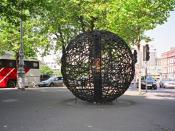The state is a self-governing body that is independent, has a permanent population as well as a defined territory and is self-supporting. It acquires the power to create and modify legislation. Therefore a state has sovereignty over its territory; this indicates that is has considerable economical, political, social and legal power. The state however also has an obligation to address the needs of the individuals of the state as well as the community, yet; on the other hand legislation is introduced to help limit the power of the state. When the needs of the individual come in difference with the varying needs of the sate, conflict arises; thereby it is required for the needs of the individual and the state to be in balance. Citizens of a sovereign state are able to challenge state power in two ways: by informal means and formal means.
The foremost differentiating factor between formal and informal means of challenging state power is that formal means are more permanent and dependable as they are set up by statutory law whilst informal means are pressuring the government through means of media and social power.
Examples of bodies that are used to formally challenge state power are the Ombudsman, The Independent Commission Against Corruption (ICAC), privacy bodies, the Administrative Appeals Tribunal (AAT) and courts. These too are limited as the Ombudsman and general government inquiries have no enforcement power.
The Human Rights and Equal Opportunity Commission is a national independent statutory government body, established in 1986 by an Act of the federal Parliament (the Human Rights and Equal Opportunity Commission Act). The federal Attorney General is parliamentary minister responsible for this commission.
Recently the Human Rights and Equal Opportunities Commission held a national inquiry into the mandatory detention policy of refugees that is currently in place...


